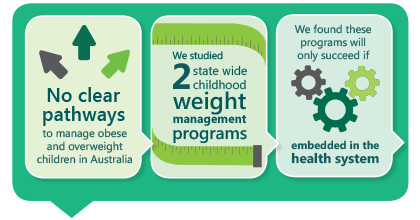

“With one in four Australian children overweight or obese, childhood obesity is a priority issue for every level of Government, but adequate services for families and children seeking help to manage weight are simply not there,” said Dr Helen Vidgen from the Faculty of Health at Queensland University of Technology.
Dr Vidgen and her colleague Dr Penny Love reviewed the effectiveness and impact of childhood weight management services by examining two state-wide programs, Go4Fun in NSW and PEACH in Queensland, in a project supported by The Australian Prevention Partnership Centre, a national collaboration of researchers, policy makers and practitioners who are working together to better understand how to prevent lifestyle-related chronic health problems in Australia.
“If you have a child with a health issue – such as poor hearing or vision ‒ there is a clear, integrated pathway through the health system and access to national services to manage this issue. But when it comes to managing childhood obesity there are no universally accessible services and there is no integrated pathway through the health services,” Dr Vidgen said.
“Our research found that specialised programs that help manage childhood obesity, such as Go4Fun or PEACH, can be highly effective but these services are not available in most parts of Australia. Advice and support is not available to families through the healthcare system until their child develops a combination of health issues related to their obesity, and that’s simply too late. The reality of all this is that for the vast majority of children and families in need, there are no obesity management services available.”
Dr Vidgen said that a national approach towards childhood obesity management services was needed, with clear roles, responsibilities, funding and communication between the different health professionals to ensure families get the services they need.
“Childhood overweight and obesity issues are complex, but we know that programs to manage this will only succeed long term if they are an accepted, established and properly resourced part of the healthcare system. This means that programs and services would no longer be vulnerable to external factors such as changes in government, funding priorities or philosophical differences. Left unchecked, an estimated one in three Australian children will be overweight or obese by 2025 so the need to find the right solutions for this complex problem is more pressing than ever,” said Dr Vidgen.
Prevention Centre Director Professor Andrew Wilson said that this project was one of 37 projects the Centre had supported to focus on identifying what works to prevent lifestyle-related, chronic health problems across Australia.
“Chronic disease is our greatest health challenge, causing the most premature deaths and disability in Australia,” Professor Wilson said.
About The Australian Prevention Partnership Centre:
The Australian Prevention Partnership Centre is finding out how we can build an effective, efficient and equitable system for the prevention of lifestyle-related chronic disease. It is led by the Sax Institute and is funded by the NHMRC, the Australian Government Department of Health, the NSW Ministry of Health, ACT Health and the HCF Research Foundation.
Find out more
- Contact the Sax Institute communications team

